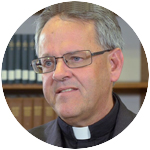
Father Thomas Dailey, O.S.F.S.
On weekdays, usually before the sun comes up, I make my way to a nearby monastery to celebrate Mass. Each day, after arriving and before the chapel bell rings, I see him. Clothed in a sweatshirt and reflective vest, with a ski hat keeping his noggin warm, he waves as he walks by, intent on completing his task.
His morning routine takes on nature’s nightly doing. Fallen branches dot the landscape, while runaway leaves clutter the small parking lot. And so he rakes. And rakes. And rakes. And piles it up on a tarp, which he then drags away to be deposited out of the sisters’ sight. Along the way, he always stops to reposition the single rose planted beside the statue of St. Joseph.
Watching this daily, it struck me that the Solemnity of Christ the King may just be too big for us.
Certainly, we should celebrate that divine appellation. The kingship of Jesus was acknowledged at his birth, by a heavenly star and earthly magi. It was proclaimed at his death, not only by the repentant thief who begged to be remembered in his kingdom, but also by an empirical placard identifying him as “Jesus of Nazareth, King of the Jews.”
[hotblock]
Rightly, then, does the church worship him whom the Book of Revelation discloses as “the Alpha and the Omega … the one who is and who was and who is to come, the almighty.”
Yes, the feast is fitting. And it is not.
Undoubtedly, the grand vision of “dominion, glory, and kingship” over “all people, nations, and languages” that Daniel describes is theologically accurate in terms of who Jesus is. We proclaim Jesus as “king” not just of a nation or an empire or the world, but as king of the entire universe!
That’s huge. Indeed, it’s so big that it’s hard to comprehend, too spectacular for us to grasp in a meaningful way.
The problem becomes apparent when we compare it to what we can see. Those who are subjects of a king usually admire him from afar, or in a moment of passing by here or there, often proud to call themselves his subjects. But after such a rare and distant encounter, they have to return to the mundane routine of their lives.
Royalty, in places where kings still exist, seems not to have any real impact on people’s day-to-day lives.
Perhaps, then we should not only look to Jesus as King of the universe, but consider instead whether he is king of me.
That’s the question asked in the Gospel passage on the last Sunday of the liturgical year. There the kingship of Jesus is revealed in a simple, direct, one-on-one conversation.
[hotblock]
Pilate asks Jesus: “Are you the king of the Jews?” Jesus answers affirmatively, though indirectly, linking his royal authority to a “kingdom (that) does not belong to this world.”
The power of Christ’s kingship comes not from military force or political influence, as it does in the logic of this world’s rulers, but from the “truth” – the truth that he reveals in his words and his deeds, the truth that God is love, that mercy is his might, that reconciliation is how he rules. The power of that truth becomes evident on the cross, on that unique and particular throne where sacrificial love triumphs over the self-serving sin of the world.
None of that matters to Pilate. He accedes to the clamor of the crowd. He allows the crucifixion to take place. He posts a sign summarizing the supposed crime.
But that sign matters to us. It’s why we go to church, on this solemnity and every Sunday that we gather to worship. As Christians, we believe in our minds and hearts that “everyone who belongs to the truth listens to (his) voice.”
We want to belong to that truth. We desire it. We long for it. We remain restless in this world until his kingdom comes.
That restlessness is eased by acknowledging Christ as King – not just as king of the universe, but as my king, our king, the One whose reign envelops the world not with royal splendor but with the everyday wonder of a God who never ceases to care for his people despite our wavering loyalty.
When we belong to that truth, we don’t just admire Jesus from afar. We see him in the daily displays of his kingdom, in the leaves and branches of our everyday tasks, where no matter our vocation, we pray that God’s will be done.
And when we listen to that voice in our hearts, we will know why nothing compares to being in this King’s presence each and every week.
***
Father Thomas Dailey, O.S.F.S., is the John Cardinal Foley Chair of Homiletics and Social Communications at St. Charles Borromeo Seminary, Wynnewood.


Share this story